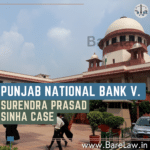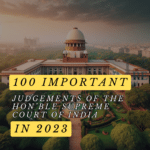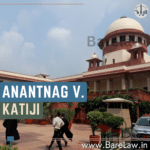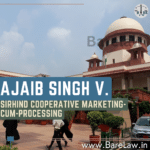PRIMARY DETAILS OF THE CASE:

Case Brief on Mukesh Kumar v. State of Uttarakhand, Civil Appeal No. 1226 of 2020
Introduction:
The welfare state has a provision in its constitution referred to as the directive principles of state policy that differentiates it from other countries. These are constitutional principles set out as directives for the legislature to make policies if they feel they have to. Because these are mere directions given to the states, both centre and states, it is not enforceable as such. That being said, can a person approach court for enforcing reservation in respect of certain articles which only provide enabling provisions and do not confer any definite right over it? This question arose in Mukesh Kumar v. State of Uttarakhand (2020) where the court held that.
Facts:
In order to give reservations to SCs and STs and OBCs people in different public jobs and departments; The Uttar Pradesh Public Services (Reservations for SCs, STs, and OBCs) Act 1994 was enacted by the concerned state government. Section 3(1) talked about reservation in terms of persons recruited indirectly while section 3(7) provided for promotions’ reservations. until revoked or varied orders shall be made therewith.
By this process, in 2001 the new state namely Uttarakhand was carved out of Uttar Pradesh along with government orders notifying corresponding changes in reservation quota percentages. It meant that there was a reduction from 21% to 19% on reservation for SC category but an increase from 2% to 4% in case of ST category and from 21%to14%in case of others backward classes.A number of petitioners challenged this move before high court.As such,the government stopped providing any kind of promotion based rationing.This order was challenged by many petitioners at high court whereas there were review petitions filed by the State also.Against this backdrop ,the Supreme Court decided to hear all those cases however framed one issue only.
Issues framed:
Some key issues which came up before the two-judge bench included,
Whether there is any constitutional obligation on the part of the state government to provide reservation for public posts and appointments?
Secondly, does such a decision not to have any reservation in posts require statistical data about adequacy of representation of scheduled castes/scheduled tribes or not?
Laws involved:
Sections 3(1) and 3(7) of the Uttar Pradesh Public Services (Reservations for SCs, STs, and OBCs) act of 1994
Article 16(4)- State may provide reservation in public employment to those belonging to SC/ST category if it thinks that they are adequately represented.
Article 16(4-A)- reservation in promotions for SC/STs if the state thinks that they are not adequately represented.
Contentions:
The learned counsel representing the reserved candidates first argued that the state should at no time refuse to collect necessary information for making reservation in public services. Second, it was their contention that the state is duty-bound to provide public services reserved for the promotion of society as per Article 16(4) and 16(4A) of the Indian Constitution which would otherwise be a violation of article 14 and right to equality.
On the other hand, learned counsel for appellants argued that there is no constitutional duty or obligation on part of state in providing reservation and further made it clear that there can be no right to seek a writ petition claiming reservation. The appellant state also stated clearly that they will not have any reservations in promotions. Therefore there was no scope of M Nagaraj case as it was not applicable here.
Decision:
Firstly, it was noted by the court and held that there is no obligation on part of the State Government to make reservation in public posts and no one has fundamental right over it, hence cannot pray for mandamus against such thing. Essentially, this means a person belonging to SC/ST has no claim towards reservations if not made by respective governments.
Secondly, referred to previous judgments in Indra Sawhney’s case, M Nagaraj’s case and Jarnail Singh held Article 16(4) and section 16(4A) are just enabling provisions so as government may take some action only after seeing enough data indicating under representation of persons belonging to Scheduled castes/Scheduled tribes especially in public posts. The provision could only be a basis depending on how representation sought under articles constitutionally could necessitate reservations.
It was also held that for determining whether or not reservation is required; collection of data becomes a pre-requisite where such a situation arises where data concerning such reservation is not necessary even if deemed unnecessary by State. Therefore, such reservations may be deemed unnecessary without having need for the government to explicate its stand.
One of the important points noted by me is that such facts are not required to be disclosed by the Government and therefore, it does not have a duty to disclose why reservation is no necessity for them even if there was under-representation of such community in any public posts. It’s a matter of choice. Consequently, earlier High court judgments which stated that data should be collected before determining whether or not reservation is needed held contrary to Supreme Court principles were overruled.





